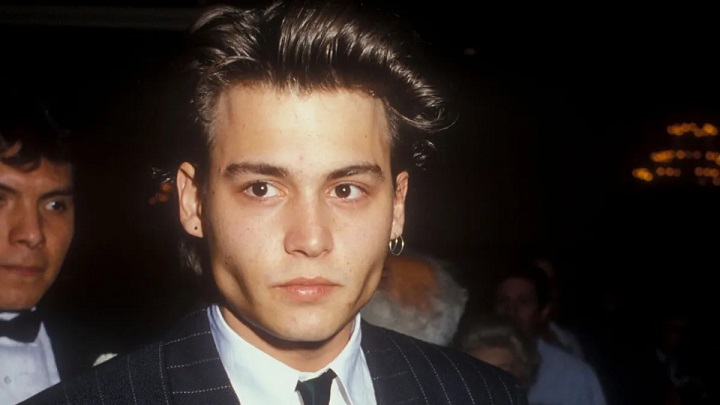
Johnny Depp, a name synonymous with versatility and magnetism in Hollywood, has captivated audiences for decades. Yet, the early years of young Johnny Depp are equally intriguing, filled with stories of talent, passion, and the unmistakable charisma that would later make him a global icon. In this detailed exploration, we delve into the formative years of Johnny Depp, examining the experiences and influences that shaped one of the most enigmatic actors of our time.
The Beginnings: Early Life and Background
Johnny Depp was born John Christopher Depp II on June 9, 1963, in Owensboro, Kentucky. Raised in a modest household, frequent moves marked his early years due to his father’s job as a civil engineer. Depp’s childhood was anything but stable; the constant relocations resulted in him attending over twenty different schools, significantly influencing his outlook on life and later career choices.
Despite these challenges, young Johnny Depp found solace in music. At 12, he received a guitar from his mother, which became a crucial outlet for his creativity. Depp’s passion for music led him to drop out of high school at 16 to pursue a career as a rock musician. He joined several bands, most notably The Kids, which enjoyed some local success and even opened for prominent acts like Iggy Pop.
The Shift to Acting: A Serendipitous Turn
Johnny Depp’s transition from music to acting was largely serendipitous. In the early 1980s, he married Lori Anne Allison, a makeup artist who introduced him to actor Nicolas Cage. Recognizing Depp’s potential, Cage encouraged him to pursue acting and arranged for him to meet with his agent. This pivotal meeting set Depp on a new path, leading to his film debut in the 1984 horror classic, “A Nightmare on Elm Street.”
Depp’s performance as Glen Lantz, a teenager whose dreams are invaded by the infamous Freddy Krueger, showcased his natural talent and screen presence. Although his role was relatively minor, it was enough to get him noticed by casting directors and producers.
Breakthrough Role: 21 Jump Street
The true turning point in young Johnny Depp’s career came in 1987 when he was cast as Officer Tom Hanson in the popular television series “21 Jump Street.” The show, which focused on young-looking police officers going undercover in high schools to combat crime, was an immediate hit and catapulted Depp to stardom. His portrayal of Hanson, a character with a strong moral compass and a tough exterior, resonated with audiences and showcased his acting range.
Despite the show’s success, Depp quickly grew disillusioned with the typecasting that came with being a teen idol. He sought roles that would challenge him and allow him to explore different facets of his craft. This desire to break free from the constraints of mainstream television led to his decision to leave “21 Jump Street” after four seasons.
Artistic Choices and Iconic Roles

Young Johnny Depp’s departure from “21 Jump Street” marked the beginning of a series of bold and unconventional choices that would define his career. Determined to avoid the pitfalls of typecasting, Depp sought out roles that were diverse, complex, and often eccentric. His collaboration with visionary director Tim Burton began during this period, resulting in some of the most iconic performances of his career.
“Edward Scissorhands” (1990) was the first of many collaborations between Depp and Burton. Depp’s portrayal of Edward, a gentle and misunderstood artificial man with scissors for hands, was both haunting and heartwarming. The role not only cemented his status as a serious actor but also showcased his ability to imbue characters with depth and humanity.
Following the success of “Edward Scissorhands,” Depp continued to choose roles that defied conventional expectations. His performances in films such as “Benny & Joon” (1993), “What’s Eating Gilbert Grape“ (1993), and “Ed Wood” (1994) further demonstrated his versatility and commitment to his craft. Each of these roles allowed Depp to explore different aspects of the human experience, from the whimsical to the profoundly emotional.
Influences and Inspirations
The early years of Johnny Depp were heavily influenced by his personal heroes and mentors. He often cites Marlon Brando, James Dean, and Vincent Price as significant inspirations. Their ability to bring authenticity and depth to their roles resonated with Depp and influenced his approach to acting.
Depp’s relationship with Marlon Brando, in particular, had a profound impact on his career. The two actors formed a close bond while working together on the film “Don Juan DeMarco“ (1994). Brando’s advice and mentorship helped Depp navigate the complexities of Hollywood and reinforced his commitment to staying true to his artistic vision.
Challenges and Triumphs
The journey of young Johnny Depp was not without its challenges. His early career was marked by a series of personal and professional hurdles, including struggles with substance abuse and the pressures of sudden fame. Despite these obstacles, Depp’s resilience and determination allowed him to overcome these difficulties and continue to grow as an artist.
One of the most significant turning points in Depp’s early career was his role in “Pirates of the Caribbean: The Curse of the Black Pearl“ (2003). Although this came later in his career, the seeds of his now-iconic portrayal of Captain Jack Sparrow were sown in the early years of experimentation and risk-taking. Depp’s unique interpretation of the character drew from his vast array of influences and experiences, resulting in a performance that revitalized his career and introduced him to a new generation of fans.
Legacy of the Young Johnny Depp
The early years of Johnny Depp laid the foundation for a career characterized by bold choices, memorable performances, and an unwavering commitment to his craft. His journey from a small-town boy with a passion for music to one of the most respected actors in Hollywood is a testament to his talent and perseverance.
Today, Johnny Depp is celebrated not only for his acting prowess but also for his ability to reinvent himself with each new role. The legacy of young Johnny Depp is one of artistic integrity, fearlessness, and an enduring impact on the world of cinema.
For those looking to delve deeper into the fascinating early years of this Hollywood icon, it is clear that the story of young Johnny Depp is as compelling as the man himself. His journey serves as an inspiration to aspiring artists and a reminder that true success comes from following one’s passion and staying true to one’s vision.

